Autonomous routing algorithms for networks with wide-spread failures : a case for differential backlog routing
Author(s)
Khan, Wajahat Faheem
DownloadFull printable version (28.42Mb)
Other Contributors
Massachusetts Institute of Technology. Dept. of Electrical Engineering and Computer Science.
Advisor
Eytan H. Modiano.
Terms of use
Metadata
Show full item recordAbstract
We study the performance of a differential backlog routing algorithm in a network with random failures. Differential Backlog routing is a novel routing algorithm where packets are routed through multiple paths to their destinations based on queue backlog information. It is known that Differential Backlog routing maximizes the throughput capacity of the network; however little is known about practical implementations of Differential Backlog routing; and its delay performance. We compare Differential Backlog to Shortest Path and show that Differential Backlog routing outperforms Shortest Path when the network is heavily loaded and when the failure rate is high. Moreover, a hybrid routing algorithm that combines principles of both Shortest Path and Differential Backlog routing is presented, and is shown to outperform both. Finally, we demonstrate further improvements in delay performance of the aforementioned hybrid routing algorithm through the use of Digital Fountains.
Description
Thesis (M. Eng.)--Massachusetts Institute of Technology, Dept. of Electrical Engineering and Computer Science, 2008. Includes bibliographical references (p. 109-112).
Date issued
2008Department
Massachusetts Institute of Technology. Department of Electrical Engineering and Computer SciencePublisher
Massachusetts Institute of Technology
Keywords
Electrical Engineering and Computer Science.